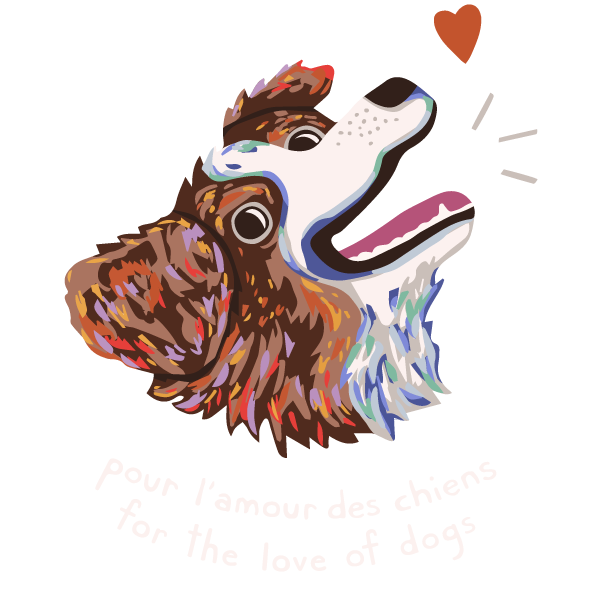At Pour l’Amour des Chiens/For the Love of Dogs, I offer five types of services training protocols designed to help you and your dog succeed together.
Puppy/Adolescent:
Age-wise, your dog is actually only considered a puppy from 8 to 16 weeks of age. Once that golden age of adorable is over, congratulations: you’ve got a teenager! Given the vast differences in their abilities, energy levels, and concentration to name a few, puppies and adolescent dogs require equally diverse approaches to their training.
I offer the following services for puppies:
- Enrichment
- Introduction to force-free grooming (or “how to desensitize your dog to the grooming process 101”)
- How to socialize (positive experiences are very important!)
- Basic commands (your old-fashioned sit & stay & recall)
- Setting your puppy up to be confident and self-secure
For the terrible teens, I offer:
- Self-control
- How to curb jumping and nipping as they explore boundaries
- Confident leash-walking (for you and your dog!)
- Enrichment with a work aspect added to help expend their boundless energy (see: “making them tired”)


Basic Obedience (for any dog older than 1 year of age):
Think of basic obedience as your manners, tricks, and trust mixed bag.
Within this realm. we’ll cover the classics, such as:
- Sit!
- Stay!
- and the famous Lie down!
We’ll also work on:
- Recall, or your dog’s reliability in responding when you call them
- Confident leash-walking (for you and your dog!)
- Proper socialization (AKA “Dog Manners”)
Aggression:
With dogs, aggression can look like:
- Possessive behaviour toward people, food, and even objects
- Biting, snapping or growling when you try to touch them or introduce something or someone new to their environment
- Any seemingly unpredictable behaviour in a situation where such a reaction would be inappropriate
Dogs who are behaving in a so-called “aggressive” way are really telling us “I AM OVERWHELMED AND I NEED MY SPACE!”


Reactivity:
Think of reactivity as your dog’s response to stimuli in their immediate environment. When you go out for a walk, does your dog engage in any of the following behaviours toward other dogs, people, or even objects?
- Barking
- Lunging
- Growling
- Snarling
If so, they would likely benefit from comprehensive training designed specifically to counter their reactivity and ease their fear and anxiety. Given how stressful these situations can be for you as well, engaging in a workable protocol with your dog would endow you with the confidence necessary to keep you both on track.
The progression of my reactivity courses is laid out to achieve maximum success for your dog (and you!). The 1st session is 1.5 hours: Introduction to reactivity, theory, followed by one practice session. This is followed up with 3 practice sessions in different environments of 45 minutes to an hour.
What some people have said about my reactivity training:
“Thanks to Riannon, I learned techniques in positive reinforcement, how to manage situations that create reactivity in Yoko and how to do desensitize so that our walks are a pleasant moment for her and me. These methods are useful in many circumstances and indispensable in everyday life. Thank you so much for your help!” – Annick G.
Sport:
Sports are a great way to further the working bond between you and your dog by adding exciting new stimuli and skills to their repertoire.
I am pleased to offer the following programs to help you and your dog engage in some fun new challenges:
- Scent detection
- Cannicross (or Dog Jogging!)
- Learning awesome tricks (a great way to strengthen your bond and mentally challenge your dog).

